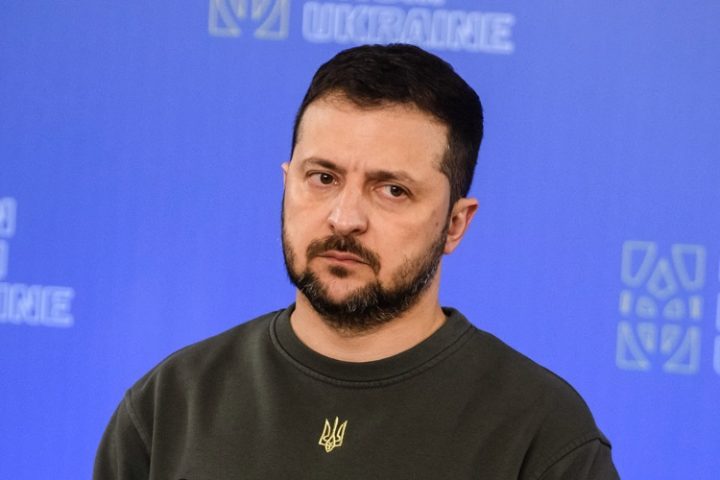
On December 4, the White House made an urgent appeal to lawmakers to authorize additional aid for Ukraine, claiming that the country was “nearly out of time” as U.S. agencies spent the final remaining funds from previous security packages.
In a letter addressed to congressional leaders, the head of the White House’s Office of Management and Budget (OMB), Shalanda Young, alleged that past U.S. aid had led to “significant military victories” for Ukraine, thus justifying more.
“I want to be clear: without congressional action, by the end of the year we will run out of resources to procure more weapons and equipment for Ukraine and to provide equipment from US military stocks,” she contended. “There is no magical pot of funding available to meet this moment. We are out of money — and nearly out of time.”
“Cutting off the flow of US weapons and equipment will kneecap Ukraine on the battlefield, not only putting at risk the gains Ukraine has made, but increasing the likelihood of Russian military victories.”
Young proceeded to point out that, as of mid-November, the Pentagon had spent 97 percent of the $62.3 billion it obtained for Ukraine this year, while the State Department and U.S. Agency for International Development (USAID) had used up all of the funds earmarked.
Moreover, the official cautioned that Ukraine’s economy could implode without sustained U.S. assistance, saying Kyiv “will not be able to keep fighting, full stop.”
While Washington has set aside more than $110 billion in various types of aid to Ukraine since Kyiv’s conflict with Moscow intensified in February 2022, U.S. lawmakers are presently disputing another tranche of aid.
U.S. President Joe Biden has requested a huge spending package worth $106 billion to fund various priorities of his administration, including military aid to Ukraine and Israel. Nonetheless, the White House faces growing opposition from a number of Republicans who have become increasingly cynical about U.S. support for Kyiv, with GOP members in the House preferring to send help to Israel alone.
Although Senate Republican leader Mitch McConnell indicated that his party was “still at the table” with critics over future Ukraine spending, House Speaker Mike Johnson has declared that Republicans in the lower chamber would only authorize more aid to Kyiv if Democrats agreed to various changes to U.S. immigration policy. Besides, Johnson mentioned “legitimate concerns about the lack of a clear strategy in Ukraine,” highlighting the need to ensure “accountability for aid provided by American taxpayers.”
On December 5, Ukrainian President Volodymyr Zelensky abruptly bailed out of a briefing with U.S. senators and White House officials owing to a “last-minute” snag, as per testimonies from a high-ranking Democrat. Subsequently, the briefing became contentious as lawmakers turned to debate about U.S. border policy and continued aid to Kyiv.
Zelensky’s team canceled the virtual meeting just minutes before it was set to start, Senate Majority Leader Chuck Schumer said, indicating that something had come up for the Ukrainian leader without providing details.
Administration officials were poised to provide updates regarding a massive military aid package for Israel and Ukraine presently up for debate in Congress, which the White House has repeatedly urged lawmakers to pass. Some GOP lawmakers have tried to bundle new Ukraine aid with funding for U.S. border agencies, with various senators threatening to hold up the spending bill unless it entails desired provisions for curbs on immigration.
After Zelensky’s abrupt cancellation, the briefing became more heated, with some Republicans, including Senators Deb Fischer (R-Neb.) and Mitt Romney (R-Utah), even walking out early.
“The point is there’s no answer to any questions down there,” Fischer told Defense News, adding “We’ve had it.” She proclaimed that she has previously backed all legislation supporting Ukraine, adding that the White House “better be worried. Because I have backed everything.”
While Zelensky canceled his Senate briefing without explanation, his chief of staff, Andriy Yermak, made in-person appearances on Capitol Hill on December 5 to garner additional aid to Ukraine. During a speech at the U.S. Institute of Peace in Washington, D.C., Yermak said Kyiv faced a “big risk” of defeat should Washington stop its military support.
“We’re at the end of our rope in terms of the existing funding,” an unnamed Zelensky advisor told Politico, elaborating that the money would not “go beyond December.”
Meanwhile, Ukrainian lawmaker Mariana Bezuglaya from Zelensky’s Servant of the People party said on December 5 that Ukrainians who hope to help the country by volunteering should enlist in the military, including women.
In a Facebook post marking International Volunteer Day, Bezuglaya thanked everyone who had volunteered to help the Ukrainian military, but contended that 2024 was time for that to end.
“The duty of the state is to provide everything that’s needed; the duty of the citizens is to pay taxes for it. The best volunteering today is to join the Armed Forces of Ukraine,” she penned.
“The people are the state; as the people, so the state,” she continued.
Shortly after, responding to a slew of comments, Bezuglaya posted more remarks.
“Dear mobilized servicemen, do you want new people to come to your unit? To strengthen you? To give you a rest?” she wrote. “That’s why I said the best volunteering for 2024 is to join the AFU. This also applies to women.”
Bezuglaya’s suggestion comes as Ukrainians anticipate their government to reveal a new plan of mobilization going forward. Bezuglaya admitted on Facebook that she had undergone military training herself in 2015. At the time, the government in Kyiv was conducting its “anti-terrorist operation” against residents of the two Donbass republics, who opposed the results of the 2014 U.S.-backed coup.
The 35-year-old was elected to the Verkhovna Rada in 2019, on the list of the newly formed party named after the TV show in which Zelensky — a comedy actor before going into politics — starred as the president of Ukraine. Her district of Kyiv was formerly represented by neo-Nazi activist and Azov founder Andrey Biletsky.
Bezuglaya is currently serving as the deputy chair of the parliamentary committee on National Security, Defense and Intelligence. She is best known for proposing a bill in May 2022 that would have permitted Ukrainian officers to execute soldiers for insubordination without a trial.
In late November, Zelensky pledged a “comprehensive proposal,” while Aleksey Danilov, the secretary of Ukraine’s National Security and Defense Council, hinted at the notion that some mobilized troops could being discharged and the possibility that Kyiv would cooperate with private firms to recruit specialists for roles fit for their skills, instead of just being “meat” for the front lines.
“Some people are scared, scared to die, scared to shoot, but it doesn’t mean they can’t be involved in other activities,” Danilov told The Guardian in November.
Danilov then stated that the military will work with two private recruiters to identify people with particular skills and convince skilled Ukrainians to enlist and help the military.
“The mobilization will become more flexible, those specialties that are required will be announced, and people will be volunteering for a concrete position,” Danilov said. “For example, they need welders or mechanics and so on.”
Russian intelligence has disclosed that Ukraine’s backers in the West have insisted on expanding military conscription to 17-year-olds, older men, and women.



